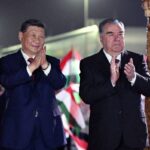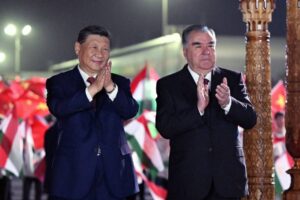Syria’s rapprochement with the Middle East is rapidly gaining steam in the wake of Saudi Arabia’s normalization with Iran and the Assad regime’s outreach to the UAE and other Gulf states.
If Saudi Arabia were to welcome Syrian leader Bashar Assad, it would be a large and symbolic move that would be seen in context of a series of steps taken by Riyadh that are reshaping the region. As well, it comes as Saudi Arabia and the UAE announced surprise oil cuts and as Egypt appears poised to announce the defeat of extremists in Sinai.
The Syrian regime’s emerging ties with the Gulf don’t seem to be slowing down. Assad visited Oman on February 20, followed by a visit to Russia on March 15. On March 10, Iran and Saudi Arabia announced the normalization of ties.
Syria is also renewing ties with Egypt; on Saturday, Syrian Foreign Minister Faisal Mekdad met with his Egyptian counterpart Sameh Shoukry. Egypt had been doing outreach to Damascus for years, but this renewal of ties is more of official, the first visit at this high a level yet.
Syrian and Saudi diplomatic pushes in the Middle East
Syria is renewing ties with one country at a time, with Saudi Arabia being the crown jewel achievement of this project.
But not every country in the region is jumping at the opportunity to establish – or reestablish – ties with Syria. Qatar has said it wouldn’t renew ties, and Turkey is also hesitant. The UAE, Bahrain, Egypt and Saudi Arabia often work in concert in the region as a sort of quartet. Kuwait, Oman and Jordan tend to work closely, but on a slightly separately yet parallel line with the quartet, while Qatar and Turkey are close partners. Iraq, close to Iran, also works with Syria, but in a different, more behind-the-scenes way – it helped broker the Saudi-Iran deal, for instance.
Saudi Arabia’s embrace of the Syrian regime, if and when it happens, will be seen as yet another move by Riyadh signaling its independent. Some have wondered how this may affect the Abraham Accords, because Israel has relations with the UAE, Bahrain, Jordan and Egypt, but has not yet achieved relations with Saudi Arabia.
Some believe that the shift towards Iran and China by Saudi Arabia could mean that the issue of potential ties with Israel is on the back burner. The full story is likely more complex.
The New York Times reported on Saturday about Riyadh’s drive for nuclear power, while other reports pointed to a potential visit to Turkey by Russia’s leader as part of Turkey’s drive for nuclear power. This is all part of a regional process of countries acting more independently and less interdependently.
What has busied Gulf media over the past few days is the possibility of Syria returning to the Arab League. If this happens, it would be nearly 12 years after the start of the Syrian Civil War in 2011 and a major step for the Syrian regime.
It would also impact many issues in the region, including US presence in eastern Syria and Iran’s entrenchment in the country. Would Syria’s sovereignty be upheld and will Turkey withdraw from northern Syria? Iran continues to use Syria’s territory to threaten US forces in eastern Syria and Israel.
UAE-based Al-Ain media asserted as well that Syria’ return to the Arab League will be a major step. The report added that Syria now has good relations with Iraq, Jordan, the UAE, Oman and Algeria, “and today Egypt completes this Arab encirclement.” Saudi Arabia, the UAE, Jordan and Egypt are all close US partners – the US has sanctioned Syria in the past as well as recently.
Anwar Gargash, a key figure in the UAE and an expert in the region and foreign policy, tweeted on Sunday that “the visit of the Syrian Foreign Minister to brotherly Egypt is another positive step towards the return of brotherly Syria to its Arab surroundings and overcoming the repercussions of the decade of chaos. The consolidation of the Arab dimension is strengthened with every step and the UAE is in the depth of this benevolent consensus.” This important statement reflects the emerging consensus.
Riyadh-based Arab News reported that Saudi Arabia’s Foreign Minister Prince Faisal bin Farhan received a phone call from his Iranian counterpart Hossein Amirabdollahian on Sunday. According to the report, “during the phone call, the ministers discussed issues of common interest and ‘the next steps in light of the recent tripartite agreement.’”
This flurry of activity in the region is unprecedented and deserves its own spotlight; it is not just a story of the US losing influence across the Middle East or, oil production cuts or of rebalancing against the China, Russia and Iran alliance. There are much larger moves taking place that are reshaping the region diplomatically.
More than a decade of diplomacy and norms are completely shifting, not just regarding the Syrian regime and the Arab League, but about a much larger movement of countries, often in concert, in which diplomacy plays the most important of roles and the region is looking to reshape its consensus.
This means that some of the “status quo” issues, such as “Iran vs. Saudi Arabia,” are evaporating. Meanwhile, other issues that once loomed large, such as the role of Qatar, Turkey and their backing of the Muslim Brotherhood, are shifting. In addition, the role and threat of extremist groups, such as ISIS, has been greatly reduced.
This means that as a decade of conflict shifts, the priorities of the region will as well. In some ways, this major shift, if it continues, could represent a change from conflicts that date back to the 1980s and 1990s. The deep roots of extremism, the rise of Iran’s “revolutionary resistance” and the role that Arab nationalism and Saddam’s invasion of Kuwait once played were crucial.
Time will tell whether what appear to be a series of important moves today are actually premature or if they have a long-lasting impact. It will also be important to see how these shifts impact Israel and its ties with many of these countries, or how it may impact Iran’s attempts to threaten Israel throughout the region.
Because the new moves in the Gulf are ostensibly about “stability,” Iran’s role as a destabilizing influence will be in the spotlight. Syria, which was a major center of instability because of the power vacuum in the country, may be seeking a return to the Arab League, but can it ever return to the role it once played in the region?
















